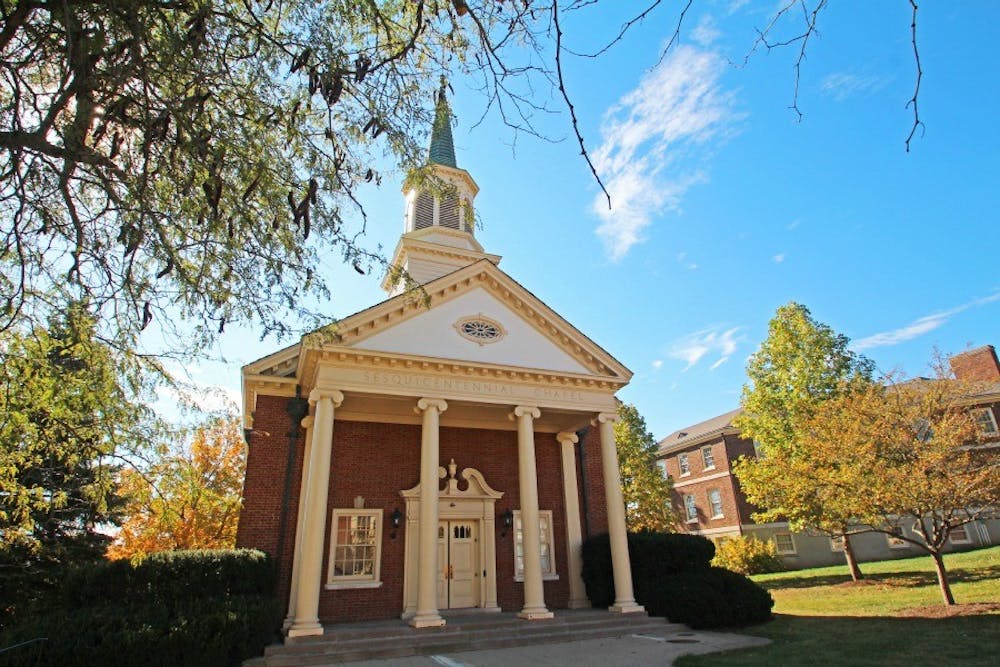By Emily Culberson, For The Miami Student
In college, students do not attend church or practice their faith as often as they did in high school.
About 70 percent of young adults aged 18-22 who indicated they attended church regularly for at least one year in high school stop attending church in college for at least one year, according to data collected by LifeWay Research in 2007.
One of Miami's on-campus churches is Oxford Bible Fellowship (OBF). Ryan Woedl, OBF's director of communications, said college kids are given a freedom to explore their religious affiliation once they go to college.
"Now it's not just something that [your] family believes, now it's something that you have to decide 'Is this what I believe? Is this how I'm going to live my life?'" Woedl said. "I worked with a youth group for 10-plus years before I started working with college students and I know that's a concern we have."
According to sophomore and regular church attendee Madi Poling, abandoning spirituality in college can have a negative impact on a person's life.
"I wouldn't say going to church has a lot to do with your faith, but it is an outward expression that you do have faith," Poling said. "I think losing that when you do go to college is super detrimental to someone's life."
However, sophomore and church attendee Oscar Ryland thinks the tendency to move away from church during college is normal.
"I think there's an expectation on college students to live their life and to become independent of their high school self and to become independent of their family," Ryland said. "And as a result some people don't end up going to church because they are finding themselves on their own."
First-year Megan Burns said, along with questioning her church's social beliefs, one of the reasons she no longer attends church is simply because it's inconvenient.
"A lot of people go out Saturday night and then they're not going to wake up to make it to [St. Mary's Catholic Church] at 8 a.m. when they have to walk Uptown," Burns said. "I would love to go to church every once in a while, but I'm not making that walk, especially with winter coming up. It's going to be freezing."
Woedl said that students' attendance in church as they transition into college comes down to how they prioritize religion.
"My personal intake is that it's a heart thing," Woedl said. "Are they attending church in high school because they have to or because they have a heart desire to grow in their love of the Lord? I think you have to see the need [to attend church] not only in your own life, but in your life serving others."
Despite Woedl's passion for ministry, she said attending church isn't the only way to practice religion.
"I don't really think it should be a goal to keep kids going to church," Woedl said. "You can be in church and still not be plugged in and still not be involved and just be a member."
Many college students eventually find their way back to church, as LifeWay Research also reported that two-thirds of college-aged students who drop out of church in college will attend church later in life.
Ryland said this could be a result of personal pitfalls that may have resulted after leaving their faith.
"I think a lot of people get to a state [in life] where they don't know what they're doing and they've lost themselves," Ryland said. "And I think one way people find themselves again is by going back to what they did as a kid. For some people, that is church."
Ryland said church has played a huge role in his college life by keeping him on track.
"A lot of times, especially during the week, I find myself slipping and doing some things that aren't necessarily good for my future," Ryland said. "So going to church every Sunday serves as a wakeup for me to make sure I'm on track and I'm being the best person I can be."
Woedl said that OBF's services are highly attended and a large portion of attendance includes college students.
"Our church services are over-attended, we are actually looking to expand our church because our church is full," Woedl said. "Students make up a big percentage of our community."
Still many leave their faith during their four years of college, but according to Ryland, finding personal identity is sometimes more important.
"I think it's unfortunate [that college students drop out of church], but I think it is important for people to find out who they are themselves," Ryland said. "I wouldn't want anyone following a faith or a spiritual background just because it's what their parents told them. I'd rather them be themselves because it's really important in life to be yourself."

